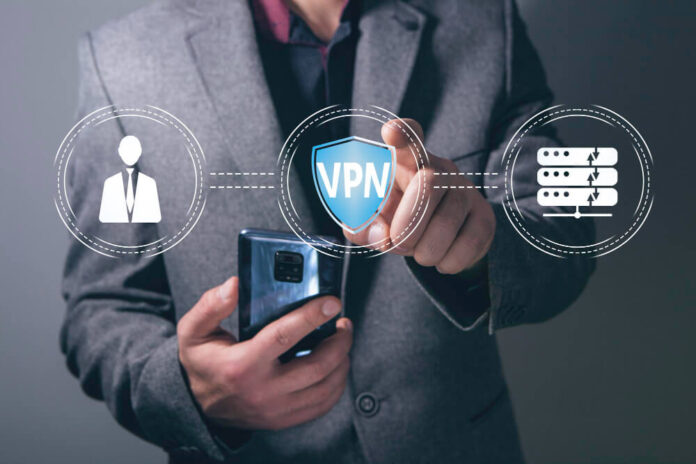So, what about startups and small companies? The options available for this customer category are not as extensive, and public opinion seems to suggest that small businesses don’t really require a dedicated VPN subscription to operate.
However, a closer examination uncovers several scenarios where opting for a dedicated cloud VPN server and team account is an obvious choice. Specifically, VPN efficiently counters man-in-the-middle (MITM) attacks, where the malicious actor redirects the victim’s device traffic through an additional node.
In some cases, this can result in complete exposure of information to the hacker. With a VPN connection, however, all data is fully encrypted and inaccessible to unauthorized parties. To help shine more light on this, this post will show you some ways using a VPN can help improve the cybersecurity of your business. So keep reading!
How can a VPN Improve Business Cybersecurity?
#1 Secure Bank Transactions
Your business may have individuals who do not regularly send or receive funds. However, if you pay for goods or services and provide sensitive personal and financial information, why expose yourself to the risk of having that data recorded and stolen?
A breach on your end could result in a major client losing money, jeopardizing a contract vital to your startup’s profitability. To safeguard against fraud targeting you or your clients, consider sourcing a VPN solution.
All cybersecurity tips for startups revolve around basic security tools, but VPN apps are the foundation of the basics. Powerful VPNs for Mac can encrypt traffic, thereby protecting any financial transactions and data you send and receive while surfing.
You can install a VPN for Mac, Windows, iPhone, and most other platforms. As for choosing a provider, consider selecting from among the top VPN providers like VeePN, which has proven itself well with good reviews and a technologically advanced app.
#2 Data Security
Utilizing a VPN connection at all times provides enhanced security for both the company’s and its partners’ and customers’ data. That makes the use of a VPN mandatory when working with online data as this can help safeguard sensitive information from malicious actors and add an extra layer of security. This is especially beneficial in countries where government monitoring of the internet is prevalent.
Adopting a company-wide cloud VPN subscription not only ensures security but also proves to be more cost-effective compared to setting up similar hardware within the office premises.
So, if you have a business with a small team renting offices in co-working spaces or similar locations where installing separate networking hardware is challenging or impossible, this will be a great option for you.
In addition, using a VPN server protects teams from potential data exposure following attacks like Wi-Fi spoofing. In such cases, a malicious actor creates a wireless network with the same name as the office network, attempting to lure employees’ devices to connect to it.
You can even use the extension in your browser. Just install the best VPN Firefox and you will get all the benefits that desktop and mobile VPN applications offer. While a VPN won’t prevent the connection itself, it encrypts the data, rendering it impossible for unauthorized decryption and revealing the accessed domains.
#3 Reliable Remote Access
IT professionals used to deploy VPN software to users in the days of yore when they needed to log into the data center from outside the office, be it from home or on the road. The reason behind this was that the company’s software, along with its back-office apps, resided in that data center.
However, with the rise of web and cloud services like Google G Suite Business and Salesforce Sales Cloud, many companies, especially SMBs, no longer require a data center. Their apps are now delivered via the cloud, and their data is stored there as well.
If you find yourself in this scenario, a personal VPN service allows your IT staff to securely deploy a remote access fabric without spending a fortune on expensive networking gear. This holds particularly true if you choose a VPN provider that grants your IT pros access to the logging data collected from their users.
#4 Protect When Using Public Wi-Fi
A small team often faces cybersecurity threats when working remotely, especially when connecting to public Wi-Fi networks in hotels or airports. These non-password-protected networks are susceptible to data interception by hackers, putting sensitive information at risk.
Although most websites nowadays use HTTPS encryption to protect data from easy decoding, certain metadata, and DNS requests remain unencoded, posing a significant security threat. VPN traffic, however, can bypass these risks as it passes through a server that prevents any interception of metadata on unsecured Wi-Fi networks.
To address this issue, many VPN apps offer a killswitch feature that blocks traffic transmission or reception when the VPN connection is inactive. This effectively prevents information interception, even on public Wi-Fi networks.
Final Note
While you are learning tips to secure small businesses, you will inevitably encounter VPNs. This is not just so; it’s because a good VPN service can protect against phishing, viruses, privacy violations, data theft, and some other risks. For startups with a small cybersecurity budget, this is practically the only tool available.
















